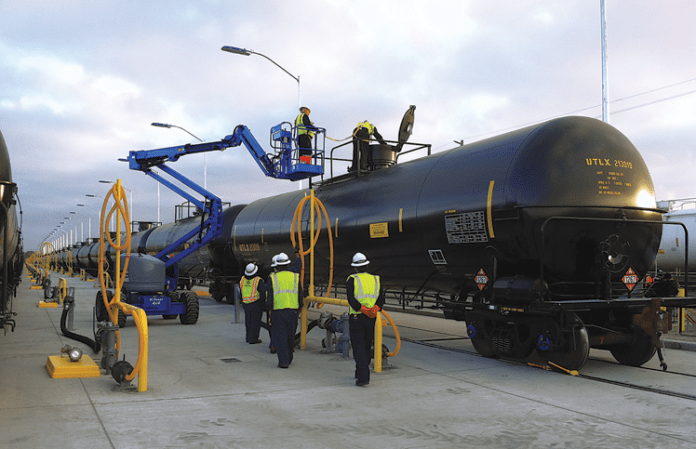With a draft environmental impact statement (EIS) due from the Washington State Energy Facility Site Evaluation Council (EFSEC) in June or July followed by a period of public comment, the Vancouver Energy project is making progress – albeit slowly.
“We’re about 20 months into what’s designed as a 12-month process,” stated Jared Larrabee, general manager for Vancouver Energy.
Larrabee added that “generally, there is concern about the length of permitting processes” not just for the Vancouver Energy terminal, but “for business across the state of Washington.” He said that processes that are transparent, robust, scientific and data-driven ideally should also be efficient and timely.
“It’s better for everyone to have a process that moves quickly, even if you’re not supportive of a project,” Larrabee said.
According to Larrabee, not only does the delay impact the joint venture (legally known as Tesoro Savage Petroleum Terminal LLC), but also delays job income for local residents and tax income for municipalities, and leaves the Port of Vancouver with a stranded asset.
Much of the debate about the proposed terminal’s fate centers around rail safety. A poll conducted by DHM Research on behalf of Vancouver Energy indicated that 72 percent (Clark County) and 74 percent (statewide) of respondents said they felt that crude oil can be safely transported by trains. A separate survey for EarthFix found that 56 percent of Northwest residents, including residents of Washington, Oregon and Idaho, support the transportation of oil by rail to reach West Coast refineries, with the refined oil being used for domestic purposes. And a survey released by Gallatin Public Affairs found that 54.5 percent of Washington voters favor shipping fossil fuels along Washington’s railways.
Recent activity in Olympia and Washington D.C. may help alleviate safety concerns. On May 1, the U.S. Department of Transportation announced regulations designed to prevent crude-by-rail accidents, mitigate consequences in case of an accident and support emergency response. Also, On April 24, state legislators unanimously passed a bi-partisan bill to improve rail safety. The legislation extends the current marine barrel tax to crude oil shipments received by rail, which will provide funding to the Department of Ecology for the expansion of its spill prevention and response programs to inland rail routes used to transport oil. Larrabee said that he views the bill as a positive step, but also applauds the more holistic approach to safety (that includes inspections of tracks and trains) proposed by Senator Cantwell’s and Murray’s legislation.
“Directionally that’s where we’re headed,” said Larrabee. “We are equally concerned for the safety of employees and the community, and for business – it’s not a viable business if it is not delivered safely.”
Over a year ago, Larrabee said, Vancouver Energy committed to accepting only the newer (CPC-1232) tank cars at the terminal.
“We were in fact one of the first to make such a commitment, despite the fact that at the time newer tank car regulations were not yet released,” said Larrabee. “As a terminal, we anticipate leading the way again with the release of the newer federal standards.”
Larrabee said that Vancouver Energy has already purchased and deployed over three-quarters-of-a-million dollars in safety and response equipment, provided training to first responders, and strategically placed equipment along the transportation route in Pasco, Wishram and Vancouver, making it available to others in the event of an incident.
“We believe the combination of what industry is doing and what is happening from a regulatory perspective will yield an additional level of safety,” said Larrabee.
If built, the terminal would allow for the delivery of crude oil from the Midwest to West Coast refineries. The Port of Vancouver is the closest deep-water port to have access to the crude oil. Larrabee stated that since the Rocky Mountains make a pipeline impractical, the next most efficient and safest way to move product is by rail. He said that East Coast refineries have used this domestic oil to displace about half their imported product, while the Gulf Coast refineries have displaced “almost all” imported oil of a similar grade.
“There’s a demand here, and a supply in the middle of North America,” said Larrabee. “There’s a market-driven need for the terminal.”
Larrabee pointed to several ways in which the proposed terminal can benefit the environment, the country and the community. Larrabee stated that the Midwest crude has a 25- to 30-percent lower carbon intensity than average Alaskan or foreign crude oil. Additionally, he said, taking advantage of domestic crude oil will make the region more energy independent, displacing up to 30 percent of imported oil and potentially reducing the price of gas, diesel, and jet fuel – things we use every day as consumers. An independently conducted economic impact assessment from Analysis Group last year indicated the proposed terminal will deliver significant economic benefit to the region, generating $2 billion in economic value and supporting an average of more than 1,000 jobs. Also, income received by the port from the terminal will be reinvested into the community, according to the port’s mandate.
Vancouver Energy isn’t waiting for the green light from the state to become part of the community, however. Larrabee said that their community investment platform focuses on three core areas of community involvement: education, safety and the environment. For example, they have donated life jackets to the Klineline Pond Borrow-a-Life-Jacket program, provided scholarship support to the Evergreen School District Foundation and donated safety equipment to the YouthBuild program.
“These examples provide a view into how we plan to continue to engage with the community going forward,” said Larrabee.
Editor’s note: Vancouver Energy is a member of the Vancouver Business Journal’s Strategic Partners Program. To learn more about the program, contact Irene Pettengill at 360.448.6013.










